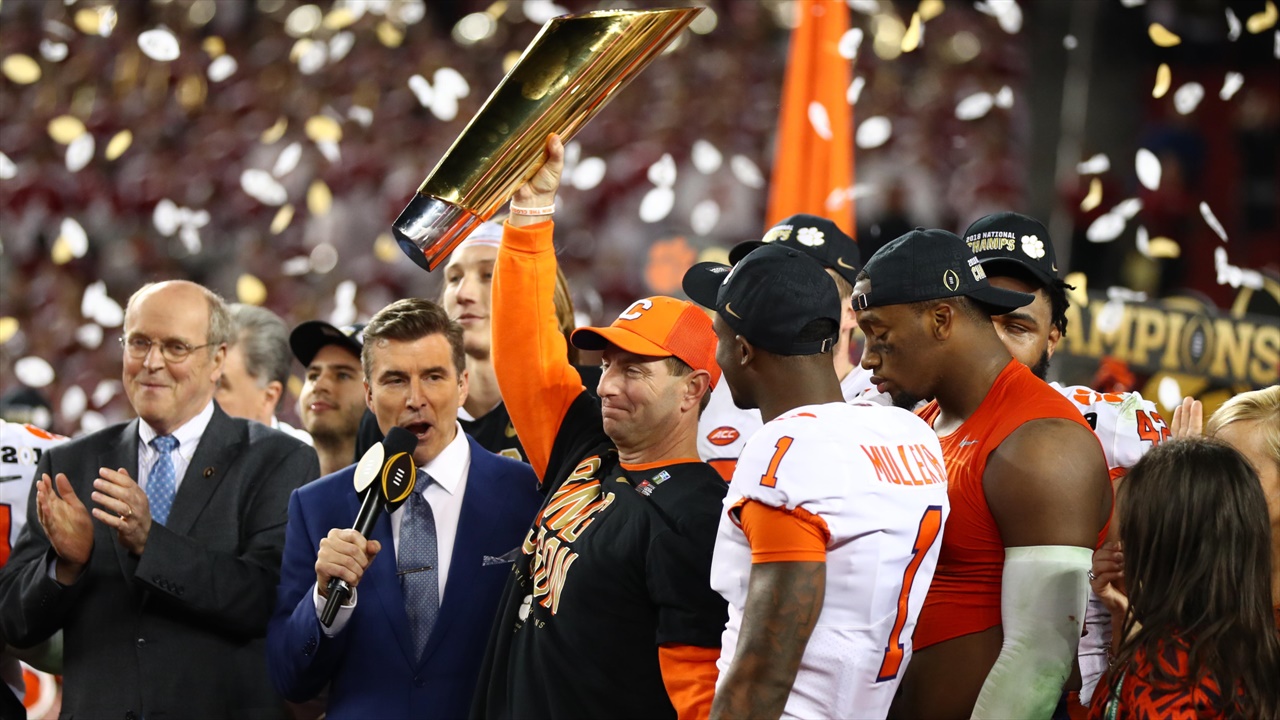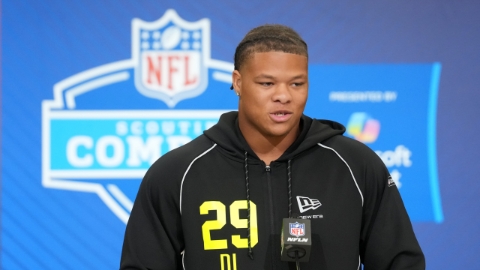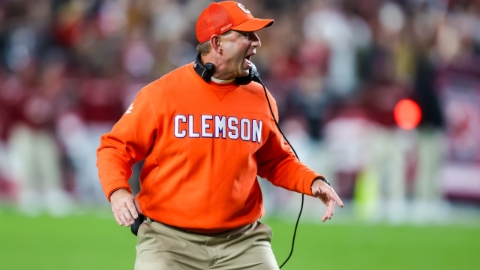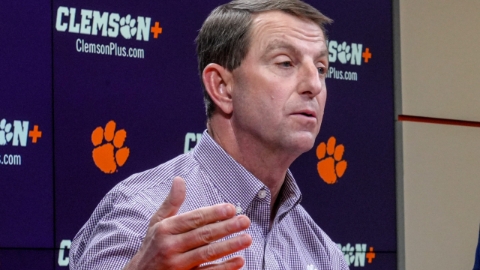
Listen to everything that was said yesterday during the CFB Playoff Expansion Press Conference.
- Mark Keenum, the chairman of the board of the College Football Playoff (Mississippi State President)
- Bill Hancock, Executive Director of the College Football Playoffs
MARK KEENUM: I'd be honored to. Welcome, everyone. I appreciate all of you coming together on such short notice to participate on this call. I'm very pleased to make an announcement, although I probably don't have to make too much of an announcement to most of you because I've been reading some of the articles that most of you have already posted about the meeting of the College Football Playoff board the managers, who met this afternoon via a videoconference. This was I would characterize as a very historic day for college football, in that the members of the College Football Playoff board of managers voted unanimously to expand the College Football Playoff format, to go from our current four-team format to a 12-team format.
The board approved the proposal that was submitted to the board just over one year ago by the working group that was of the management committee. The work they did and presented to the board was the proposal that we adopted and approved, again, unanimously this afternoon.
Part of the approval, in addition to, again, going from four to 12 teams, we've asked our commissioners, who are the management committee, to now go forward and develop the plans for how we can implement this 12-team format. There's still quite a few issues that have to be resolved, some very obvious logistical issues that have to be resolved, but our hope is that we can get them to move on this as quickly as possible to do so.
Now, our current media contract under the current four-team format, it goes through the 2025 football season, and so our plans are to begin the 12-team format for sure beginning in the 2026 football season.
However, we have asked our commissioners, the management committee, to explore the possibility of us beginning the 12-team playoff format before the 2026 season, in either 2024 or 2025.
Again, we as members of the board recognize there's some pretty substantial issues that have to be resolved, but we're asking our commissioners, the management committee, to explore that possibility to see if we could possibly begin the playoff, again, before the 2026 football season.
A big day, historic day, and I'm very proud of my colleagues on the board of managers for the outstanding work that they've done. Their due diligence and all the hard work that they've put into this, working with all the many presidents and chancellors that they represent from their respective conferences, all their athletics directors and coaches from all across the country to get to today's vote so we can move forward with a new opportunity for student-athletes to participate in our nation's national college football championship tournament, if you will. It will be a new day for college football, and I'm excited. I'm excited for all the college athletes who will be able to participate in this new format and for our fans of college football all across the country.
Again, I'm very happy and very pleased that we were able to do this this afternoon.
With that, I'll turn it back to whomever or to Bill, if you have any comments you'd like to provide.
BILL HANCOCK: I would just echo what Dr. Keenum said. It's a great day for college football, great day for the sport overall.
I also just want to take a minute to thank Dr. Keenum for his leadership. You know, he has a day job, and get he and the other board members have volunteered to serve on our board, and they have plenty of work to do with their day jobs, but they've also devoted a lot of time and energy to the CFP, particularly over the last few months.
I want to thank them for making this happen. Thank you, Dr. Keenum.
MARK KEENUM: Well, you're kind. Bill. I appreciate your leadership and your team, and you're right, I can't say enough about these outstanding members, these presidents and chancellors who serve on this board and the time commitment that they've made to this. They're outstanding, and I'm just honored and privileged to be affiliated with these outstanding leaders.
President Keenum, if you could just speak for your fellow presidents, did you get an idea of why the Pac-12, Big Ten and ACC changed positions, because it seems as if their commissioners had been in opposition to this proposal, and what may have led to a change in position from those conferences? Did they make any of that available to you?
MARK KEENUM: You know, we've been having this conversation for quite a while. These presidents and chancellors have had to spend time with their colleagues. Like I said, I'm not just representing my institution; I'm representing 14 institutions and those leaders on those campuses and all their coaches and athletics directors.
These presidents on the board, they needed the time to talk with their colleagues and their respective conferences and do all their due diligence, a lot of questions and work with their commissioners and their leagues, and they've done this. They've spent the time. They've put the effort in to get to this point.
I think it's just been a cumulative effort by all these individuals to get to the point where they feel – not just these particular conferences that you identified but all of the conferences that are on the board went through the same process, and to get to the point where it's time for us to make that decision, to give some direction to our commissioners who are on the management committee, and that's what we do.
As Bill mentioned, in our day jobs, as presidents and chancellors, we have to make decisions, and it got to the point where it was time for us to make a decision to get some direction so that now our commissioners can go forward and hopefully put this together for this expanded format for all of our student-athletes for college football.
Why now? Why the need to take control and do it at the presidential level as opposed to waiting for the commissioners? Were you guys just tired of waiting? Why this Friday here and now?
MARK KEENUM: Well, it's time. It's time to make a decision. We need to give direction to our commissioners. We need to be – and we did. We felt like we needed to give them a definitive, this is where we are, this is where we think college football needs to be headed as far as the playoff is concerned for our national champion, and we represent all of the presidents and chancellors all across the country, and Notre Dame, okay.
We've had our opportunity to do all of our visits and our conversations among our teams and conferences, and I do believe that these commissioners, they need this direction from this board.
I'm pleased that we were able to give it to them today.
I can sense that there was some frustration, and there was back in January with some of the leagues that were supportive of this initial model. Can you just talk about the switching attorneys that took so long for you guys to get here? Between January and now, how frustrated were you and the other groups of presidents who were deciding to take this into your own hands now?
MARK KEENUM: Look, I recognize that we all come from different parts of the country. We all represent different universities and backgrounds. There's a lot of dynamics that go into this. There's a lot of moving parts in not only college football but in all of college athletics these days. There's a lot going on that demands a lot of attention for all of these member institutions and these conferences. There's a lot happening in collegiate athletics today.
I think that contributed to the members of this board and the conferences they represent to take their time, to do their due diligence, to make sure before we make this big step that we're doing it in the right way. So it just took time to develop.
I recognize that, and I appreciate that, but it got to the point where we had addressed as much as we could go through, and it was time to make a decision one way or the other, as far as I mentioned earlier, to provide the direction that our commissioners needed, the management committee needed to go forward.
It just needed the time, and I think it was an appropriate amount of time. Today was the time we needed to make a decision, and I was very pleased that we did.
Dr. Keenum, you mentioned the commissioners, now it's up to them to decide when this thing can be implemented and that there are issues to that. Can you talk a little bit about those issues, and what are the hurdles to try to get this implemented early in '24 or '25?
MARK KEENUM: Well, you may all be familiar that we as a CFP just announced that the sites for the 2025 – January 2025 game and the January 2026 game, Atlanta and Miami. We've already announced the sites and the dates, so we've got to change that. If we start this before the season of 2026, we've got to go back to those sites, and are those sites available? I don't know. Can we pull it off? We've got the bowl, the semifinal playoff dates will have to be changed.
Just the logistics of doing this for the 2024 season and the 2025 season is going to be a tremendous challenge for the management committee to get their arms around and see if it's even possible.
That's I would say first and foremost a big challenge for the management committee.
Also, that's just addressing starting it earlier. I think that the perspective looking beyond the 2025 season for 2026, we have our current contract with ESPN as our media provider. They've obviously got to start this process of having this new format to now go out before the broadcast media world and try to come up with a new media contract beginning in 2026, and that what's going to look like and what that will entail.
So there's a lot of work to go forward beyond the current contract that runs through, again, the 2025 season that the commissioners are going to have to engage in as far as the negotiations.
Then, like I said, the logistics of trying to do this in '24 and '25, the seasons of 2024 and '25 is going to be tremendous for these commissioners. They've got a lot of work to do, and we're encouraged, and we're hopeful as a board that they can get this started before, again, the end of the current contract. But if not, we know going forward with the new media contract and for college football that for sure 2026 we'll have a 12-team National Championship playoff format.
Making that decision and going ahead and letting the college football sporting world know this, we all as a board felt like we needed to go ahead and make this decision, inform everyone that this is the direction we're headed in. It's good for college football, as Bill mentioned earlier, and it's the right thing to do to go forward for our student-athletes.
Again, there's some pretty big issues that have to be worked out.
I think it's in the contract that – has ESPN in fact agreed to pay more for '24 and '25 if you expand?
MARK KEENUM: I'm going to let Bill answer that question.
BILL HANCOCK: Yes, the terms of the contract are confidential, so I'm unable to address that, but I would say that ESPN has the first right to those games, but the financial part is something that we just can't talk about. Sorry.
Dr. Keenum, what confidence do you have in the commissioners to land the plane without further presidential intervention, particularly when you don't know who's going to be in what conference, the revenue split which I'm led to believe is decided by the commissioners among the 10? What confidence do you have that they can get all this done?
MARK KEENUM: I have complete confidence in our commissioners to work together. I think they needed some direction from the board. Now they have it. Now that the board has given them some direction, I am very confident that they'll be able to work together to come up with a plan to go forward for college football.
BILL HANCOCK: Revenue distribution will be decided by the board. When we did this last time back in 2012 and 2013, the commissioners did make a recommendation to the board. The ultimate decision is the board.
That same format then, the commissioners will make a recommendation?
BILL HANCOCK: We don't know yet, we haven't talked about it, but that's what I would expect to happen, yes.
Going back to the question at the start, you've obviously been talking about this for a long while, and I'm curious, did the final metrics of like the Big Ten TV deal play any role in moving toward any vote for approval today as y'all saw what the market was willing to do for live sports, or was there some other crystallizing moment for the members of the board over the last few months?
MARK KEENUM: I have no comment on that. I have no idea how that had an impact on the Big Ten's decision to – look, the Big Ten, Eric Barron, former president of Penn State, served many years on this board with me, and from the very beginning, it was Eric Barron with the Big Ten was one of the real outspoken advocates for expanding college football, the playoff format, from only four teams.
When we were looking at options and discussing what it would look like, how many teams, and when we started settling on 12, Eric was a very strong supporter of the 12-team format.
The Big Ten was from the very beginning of this whole dialogue was a strong leader in this area of expanding the College Football Playoff. Kristina Johnson, who was the president of the Ohio State University, now represents the Big Ten, and she has been a real pleasure for me personally to get to know and work with.
As far as your question on their TV contract, I don't know that that – I don't know that I can comment on that.
If I may clarify that question, it was more of did what they wound up getting and seeing what the market was going to do for live sports right now, did that affect any member of the board in terms of thinking the market is paying these huge sums right now, maybe this is the right time for expansion? It's not a question about the Big Ten –
MARK KEENUM: There's no one on this board or any of the presidents of any of the schools that we represent – we're not naïve to understand there is added value by having expanded playoff, but I can tell you from being part of these discussions from the very beginning, what motivated the presidents and me, as well, was that we need to have an opportunity for more participation of teams in our nation's National Championship tournament, and having only four teams, we felt like that's not fair to our student-athletes from a participation standpoint.
So what started this from the very beginning was student-athlete university participation, again, for our nation's National Championship.
We do recognize there are additional revenues that will be available, but that hasn't been the driving force behind this ultimate decision. It has not been.
Let me ask you this, Dr. Keenum: When you look back on this process as someone on the board of managers, someone who's spent a lot of time on it, how would you explain to a layperson who doesn't follow in the leads of all this, why this took so long?
MARK KEENUM: Well, I don't know why it took so long. I know that this was a proposal that we first presented – well, I can go back. I can comment on a couple of things. When we first started the discussion about going somewhere beyond four teams, we as a board asked the management committee to start the dialogue and start working together, and they formed a working committee within the management committee or working group, and they did a deep, deep dive into all the different myriad of options, from eight teams to 12 teams and 16 teams and beyond. They looked at all types of iterations of what it could potentially be.
Then in 2020, you all know what happened in 2020. They didn't think we would even have a college football season that year, and the one we did was greatly impacted by the pandemic. That put everything behind schedule.
We were dealing with a lot more important things than just College Football Playoff at that time, and it carried over into the '21 season.
We had a very robust, I thought, productive meeting in January up in Indianapolis, and we had some follow-up videoconference meetings amongst ourselves since then, and we've been working with our commissioners and they have been meeting and talking on this subject. So it just took time for this to evolve and develop into what we have today.
Did it take too long or should we still be talking on this? I don't know. We just felt like we need to – this was the right time. We see possibly – I emphasize the word "possibility" of this possibly starting before the start of the '26 season, and we recognize that the longer we wait in making a decision that that window of opportunity will absolutely close, and we may not be able to start this before the '26 season.
We're willing as a board to get to empower our commissioners to see if that's a possibility and to go forward and try to do it. If we're going to give them that authority, we've got to go ahead and make this decision and do it now.
Again, I was thrilled that that was the decision this afternoon.
Can you elaborate why it was unanimous at 12 and just how much other serious conversation there was for maybe 16 or any other number?
MARK KEENUM: Why was it unanimous for 12 and not some other number? Is that what I understand?
Yeah, what do you guys like about the 12-team format and how much conversation did 16 or any other number generate?
MARK KEENUM: Well, I'll just speak for myself. I liked the proposal. I liked it when it first came out and we started working together on this. I liked it. I had a chance to visit with my colleagues within the SEC, and the Southeastern Conference presidents and chancellors approved this back some months ago. We've been very comfortable with this.
Again, I think most of the presidents were very comfortable, and a lot of it we got down into – started getting into some of the details and logistics, and they just kind of, for whatever reason – and then somebody said, well, why can't we think about other options.
I think that most all the presidents – I'll say this: All the presidents believe that the 12-team format is the right thing to do for this moment. Will we always be at a 12-team? I can't answer that. Will we continue to look at ways to further improve the playoff going forward in the out years? Absolutely. I think you always have – people in your profession who are on the pulse on college football will be speculating about how bad the 12-team format is and we ought to be at a 24-team format.
My goodness, I have a head football coach who thinks we ought to have a 64-team playoff, and I mean that. That's what he believes.
My point, there's always going to be room for improvement, always. I think that you'll see this organization will always be open to suggestions for how we can further improve the experiences for our student-athletes, for the fans all across this nation who love college football, to make it a better experience for all, to be more inclusive, to provide more opportunities for participation.
Again, but this is a great number for us to settle in on, and I'm optimistic that it will be very successful going forward.
Dr. Keenum, today in the discussion among the presidents, what were your options? Obviously you passed it unanimously, but could you have passed it 10 to 1 or 9 to 2? What were the set of options before you?
MARK KEENUM: Well, if the expanded playoff were to begin before the 2026 season, we would have to modify our current existing contracts that we have in place. To do that, it would require a unanimous vote. We knew going into this that there's no way we could expand the playoff in 2024 or 2025 unless there's unanimity amongst all the members of the board.
Going beyond 2025 and starting in 2026, we do not need unanimous consent going forward. We knew that as board members, that going forward and what the format would look like, we would not have to have unanimous consent.
In light of realignment and as you mentioned the landscape of college athletics, how important do you think a decision on this is for stability and for kind of keeping the conferences working together and tethered to each other for something like this in the future?
MARK KEENUM: Well, I'm sure it'll be positive. How, that's not something that I've dwelled on. I can't speak for my colleagues; I don't know how this plays into the whole landscape of college athletics. I don't.
But I do see it as a very positive step for college football that we are, again, giving more opportunities for universities, for student-athletes to participate in their nation's championship.
In sports history and particularly lately college football has been a regional sport. How important is this now that you can sell this to – not sell it, but promote it as a way in for Cinderella, the West Coast, for the entire country to at least theoretically have a shot?
MARK KEENUM: Absolutely. I think it strengthens the value of the whole regular season, and I think fans will be even more so engaged. College football fans are outstanding. I'm a huge college football fan myself, and I think this just adds to the dynamic.
As you get especially over into the season, how your team is doing, it makes your regular season games more exciting because they almost become playoff games just in themselves, that if you win this game it'll better position you to make it into the national tournament.
I think it's going to be just wonderful for all of our fans, for all of college football across the entire nation.
THE MODERATOR: Dr. Keenum, appreciate the time. I think you have to run now.
MARK KEENUM: I do, I'm sorry. I appreciate all of you being with us this afternoon.
Bill, I know there's going to be a meeting next week in Dallas. Could you maybe outline some goals of this meeting given what happened today, what that means for those meetings next week?
BILL HANCOCK: Yes, and I think Dallas will be the beginning of an implementation process. I would say identify the steps that need to be taken to implement in 2026, first of all, but then also identify what might need to be done to implement in '24 and '25. As Mark said, there's a lot of work to be done, and I think – I expect next week will be the beginning of that work.
We went through all this back in 2012 and 2013, of course, when the CFP started, and it was challenging and stimulating, and I expect it'll be the same this time.
How many president-only calls were there, and just sort of when did you guys – what was the process of the board making the decision to kind of grab this by the reins?
BILL HANCOCK: Let me think about this. The board had, to my knowledge, three, but I know they were talking amongst themselves, had been talking amongst themselves for a while.
I would also say y'all heard the commissioners at media days all saying they were for expansion, and I know the presidents heard that, also.
We knew all along that the presidents would make the decision, and by "we," I mean all of us, you all, commissioners, coaches, and that's what happened today.
Deadlines throughout this process have been I would say pretty soft. But are you going to be able – is there going to be something that looks like a hard deadline to determine if implementation can be done by 2024? Have you already looked at a calendar and said, hey, seriously, guys, this needs to be done by X?
BILL HANCOCK: Yes, of course I've been thinking about when the deadlines might be. We won't know that until we have a chance to consult with the cities. Dr. Keenum was right; we obviously have Atlanta and Miami to work with, but we also have to determine the dates of the games and determine whether any of our bowl games would need to be asked to change their dates. He's right; there's a lot of work to be done. But we'll roll up our sleeves and see where we can get.
Bill, you are always sort of an eternal pessimist when there's things to be done. You bring up all the obstacles rather than the potential of things happening. How would you characterize in English, without diving into the logistics of hotel rooms and availabilities, what the reality is of the chances of '24 and '25 happening?
BILL HANCOCK: I can't put a number on it. I just know there's a lot of work to be done, and I suspect the cities are going to want to help us however they can, but we just don't know yet. We just haven't dived into talking about it.
I wouldn't want to handicap it other than to say there's a lot of hurdles.
Contractually, how complex do you think that is?
BILL HANCOCK: By the way, I hope everybody heard Pete say that I was the eternal pessimist. Now, coming from Pete, I think that is the pot calling the kettle black.
But sure, there's contracts that need to be looked at.
TV-wise, I guess.
BILL HANCOCK: Yeah, and TV-wise. We haven't dived into this with our rightsholder yet. We will.
There's a charge for there to be multiple partners; does that charge go for '24 and '25? Obviously the next deal there's going to be multiple bidders or the exploration of multiple bidders. Do you know for certain if you're going to go in '24 and '25, do the presidents want multiple TV partners?
BILL HANCOCK: Yeah, let me say this, and you've said this at the end of your question. Let's be clear, there is a charge to explore multiple partners starting in '26, and we've all committed to do that. But '24 and '25 ESPN does have certain rights, and again, I don't want to get too deep into the contract, but they do have certain rights to the four new games. Obviously they already own seven of the 11 games that we'll have in the 12-team event, and they have certain rights, opportunities for the four new games.
We haven't talked to them about it, but we'll start that next week.
THE MODERATOR: Thanks, everybody.
BILL HANCOCK: I want to say this, too. I'm glad we could bring it all together for this. I appreciate how you've all been chasing this story and I know it's not easy, and when we thought about how do we make Dr. Keenum available, I think Brett said let's get a small group. So I appreciate y'all on short notice dropping everything and joining this, and also appreciate the way you've covered the story. It's not been easy. So thanks.



